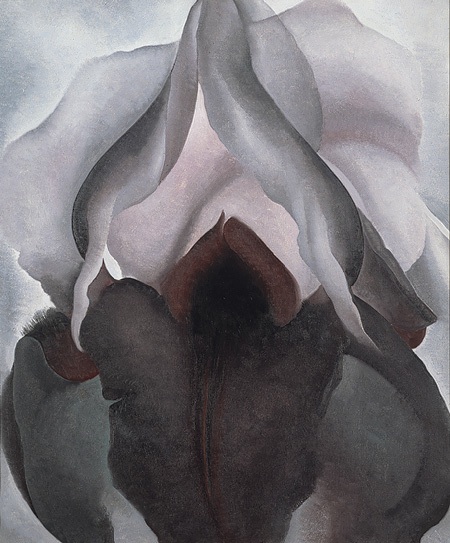Rickey Laurentiis’s poem is one of the great ones. A poem that upon hearing aloud at a deliberately queer reading at AWP instantly became part of my vocabulary and I wanted to hear more and have and yet I keep helplessly returning to this one, called “Black Iris” with a dedication: “for Georgia O’Keefe.” I apologize, cornily, and I put the painting here. I am a beloved victim of this work, first hers, then his. Having lived through either the sixties or the seventies or was it the 80s when Georgia O’Keefe was so hot and seeing posters of flowers by her till I thought I would pop and yet finally living briefly in New Mexico and visiting the Pedernal, her famous mesa, and seeing the paintings then in the light and the landscape that grew it, and then discovering her paintings weren’t in New Mexico at all, were they, but the best one was in the Chicago Art Institute so we passed through on the way home and saw an astonishing black cross. Rickey’s poem surprised me instantly at the prospect of a young black gay man using O’Keefe’s work. Why not. The filing of it felt disruptive which is what the poem’s content is about. Apprehending the black at the center of the painting, a black purple and equating it with a dying cow, tongue, sex, violence, death and the inability to erase oneself or not be party to what one has been forced to become, to witness, to know. Rickey’s poem forces you through itself, all shuddering. If it were to make an action it would be pinchy, how if you were trying to contain something live and writhing within your two fingers, the forefinger and the thumb, perhaps or your two hands, probably you would fail. The size of the subject, the opening, the player who was trying as in a nightmare to accomplish some agonizing task would simply become the very living measurement himself of this impossibility. The sound would be a series of squirms, the music of a very violent act. And this becomes beauty in Rickey’s hands:
I should call it beautiful, or beauty
itself, this dark room, broom closet, this
nigger-dot. I should want to fit
into it, stand up in it, rest, as would
any beast inside a stable. I should want to
own it, force it mine, to know it
is my nature, and of course don’t I? Of course:
why should I want it?
Can I link you to the poem. It’s this. And all I want to draw your attention to now is that “don’t I.” The modal shift that steps on a pedal inside the poem and goes deeper inside itself without italics - insisting on the presence always of an ever greater danger and depth. And there is a moment too at the end when trembling legs become trembling voice. The poem ends with the ultimate poet question, which is to slightly do the poem an injustice to pull it out of context now and make it do that, though I promise it will snap right back to its very own meaning in place:
…What else
has he? Only because the voice outside him
makes him.
Eileen Myles was born in Cambridge, Massachusetts, and was educated at the University of Massachusetts...
Read Full Biography


